RTX 4070 vs 4070 Ti: Nvidia's latest graphics cards battle for gamers' respect
We compare the RTX 4070 vs 4070 Ti to help you find your next GPU
Sign up for breaking news, reviews, opinion, top tech deals, and more.
You are now subscribed
Your newsletter sign-up was successful
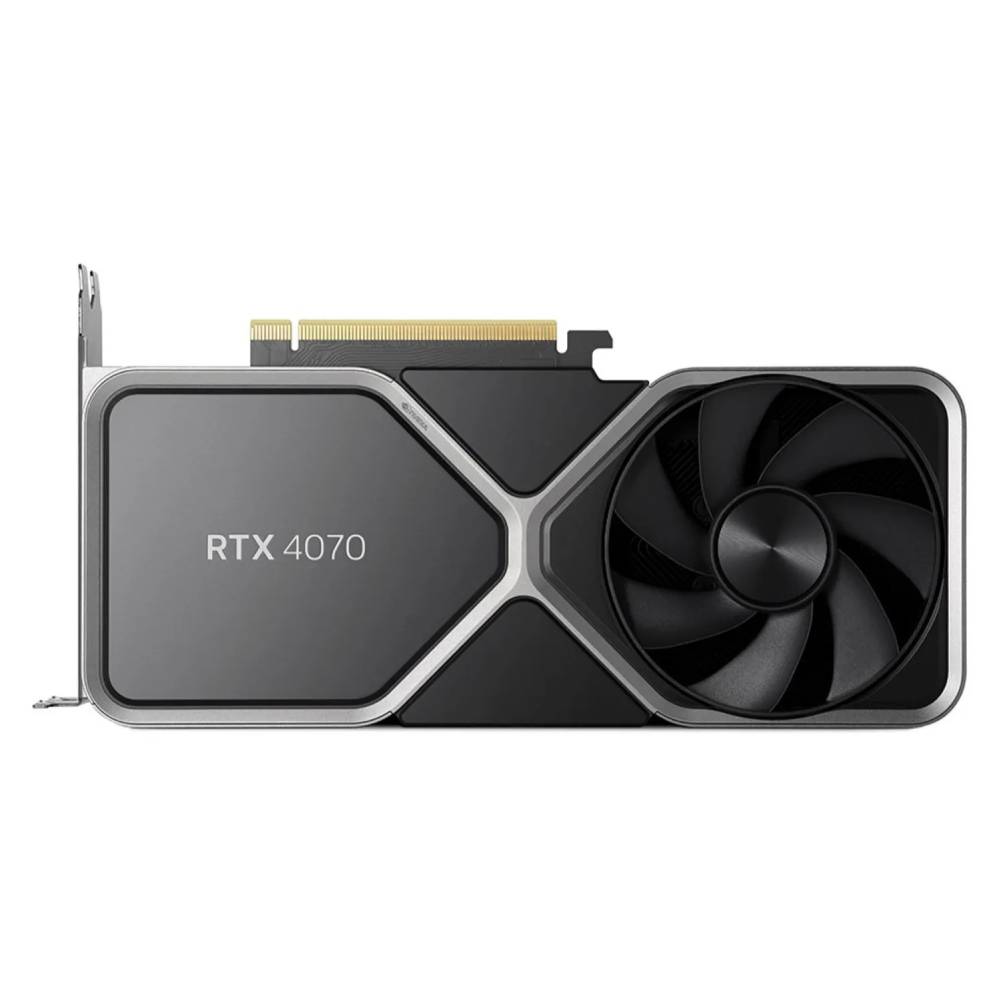
Shaders: 5,880
Ray processors: 46
AI Processors: 184
Boost Clock: 2,475 MHz
VRAM: 12GB GDDR6X @ 21 Gbps effective
TGP: 200W
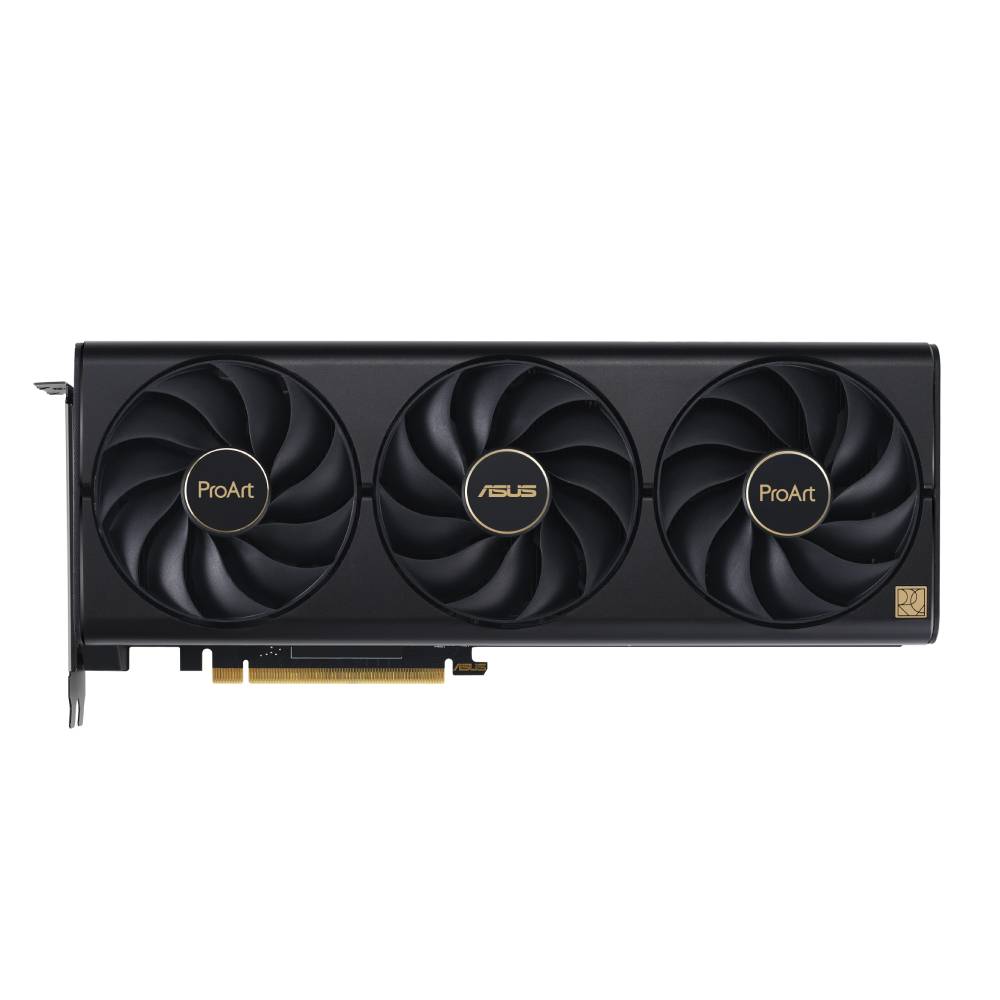
Shaders: 7,680
Ray processors: 60
AI Processors: 240
Boost Clock: 2,610 MHz
VRAM: 12GB GDDR6X @ 21 Gbps effective
TGP: 285W
The midrange graphics card market is usually the most exciting when it comes to options for 1440p and 4K gaming that won't break the bank, and that's where we find the biggest strengths for Ada's 70-class cards. Comparing the RTX 4070 vs RTX 4070 Ti isn't as straightforward as you may imagine, especially because now we've not only got the RTX 4070 Super as a successor model, as well as the RTX 4070 Ti Super, but also the RTX 5070 (and RTX 5070 Ti), as Blackwell has superseded Ada.
Despite being over two years old, both the RTX 4070 and RTX 4070 Ti remain some of the best graphics cards on the market from a price-to-performance perspective, and you shouldn't write either of them off given the dismal state of RTX 5070 stock right now. It all comes down to value when the price is right, and there's a ton of life in Ada's hardware yet, thanks to the implementation of DLSS 3 and Frame Generation, so you won't be too behind with a 70-class card, even though Blackwell has since come in and stolen some of the thunder.
For more on how Ada compares to Blackwell, we've compared the RTX 4070 Super vs RTX 5070, and you can also read into whether a 70-class or 80-class card is right for you with our features on the RTX 4070 vs RTX 4080 and the RTX 4070 Ti vs RTX 4080. Additionally, you can see how the RTX 4070 and RTX 4070 Ti slot in when compared to some of the best 4K graphics cards around, too.
Nvidia RTX 4070 vs RTX 4070 Ti: Price
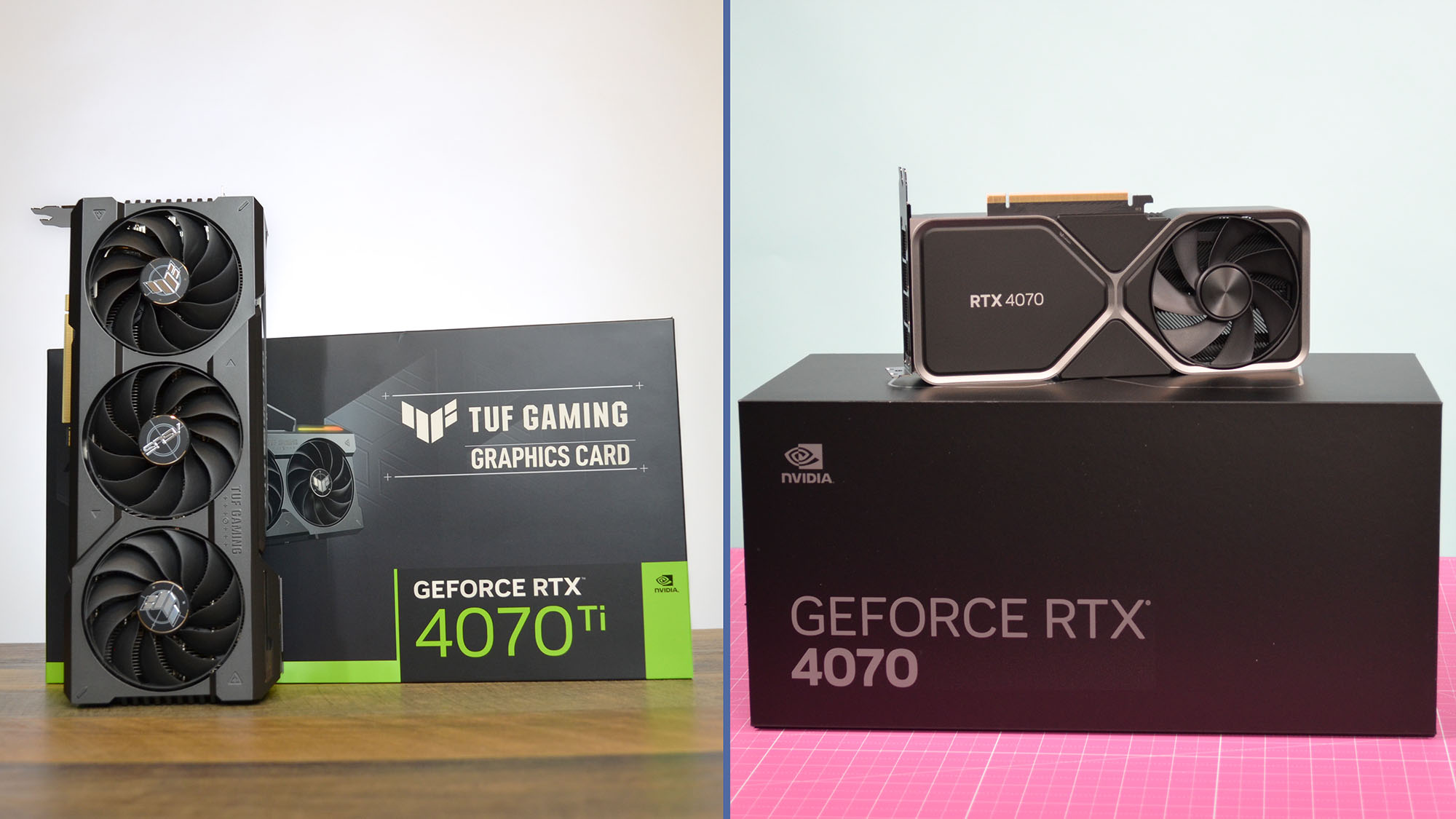
This is, fortunately, one of the easier categories to measure, at least on a surface level.
The Nvidia RTX 4070 has an MSRP of $599, which converts to about £525 or AU$870. This is a 20% price increase over the $499 MSRP of the Nvidia RTX 3070 launched at the end of 2020, and while nobody can claim this is a good thing, it's worth noting that the RTX 4070 isn't the only card seeing its prices rise.
The Nvidia RTX 4070 Ti, for example, has an MSRP of $799 (about £680 / AU$1,160), which is about 25% more expensive than the $599 MSRP of the Nvidia RTX 3070 Ti. In that sense, the RTX 4070 wins out somewhat for getting too big of a price increase, relatively speaking.
More importantly though, both of these cards need to be evaluated based on their value to the consumer, that is to say: how much performance are you getting for the money you are spending? While I won't spoil the upcoming performance section on that front, I will say that both the RTX 4070 and 4070 Ti offer the best and third-best performance-per-dollar value, respectively, of any of the cards I tested recently, which goes a long way to accepting the higher prices being charged.
Sign up for breaking news, reviews, opinion, top tech deals, and more.
- Winner: Nvidia RTX 4070
Nvidia RTX 4070 vs RTX 4070 Ti: Design
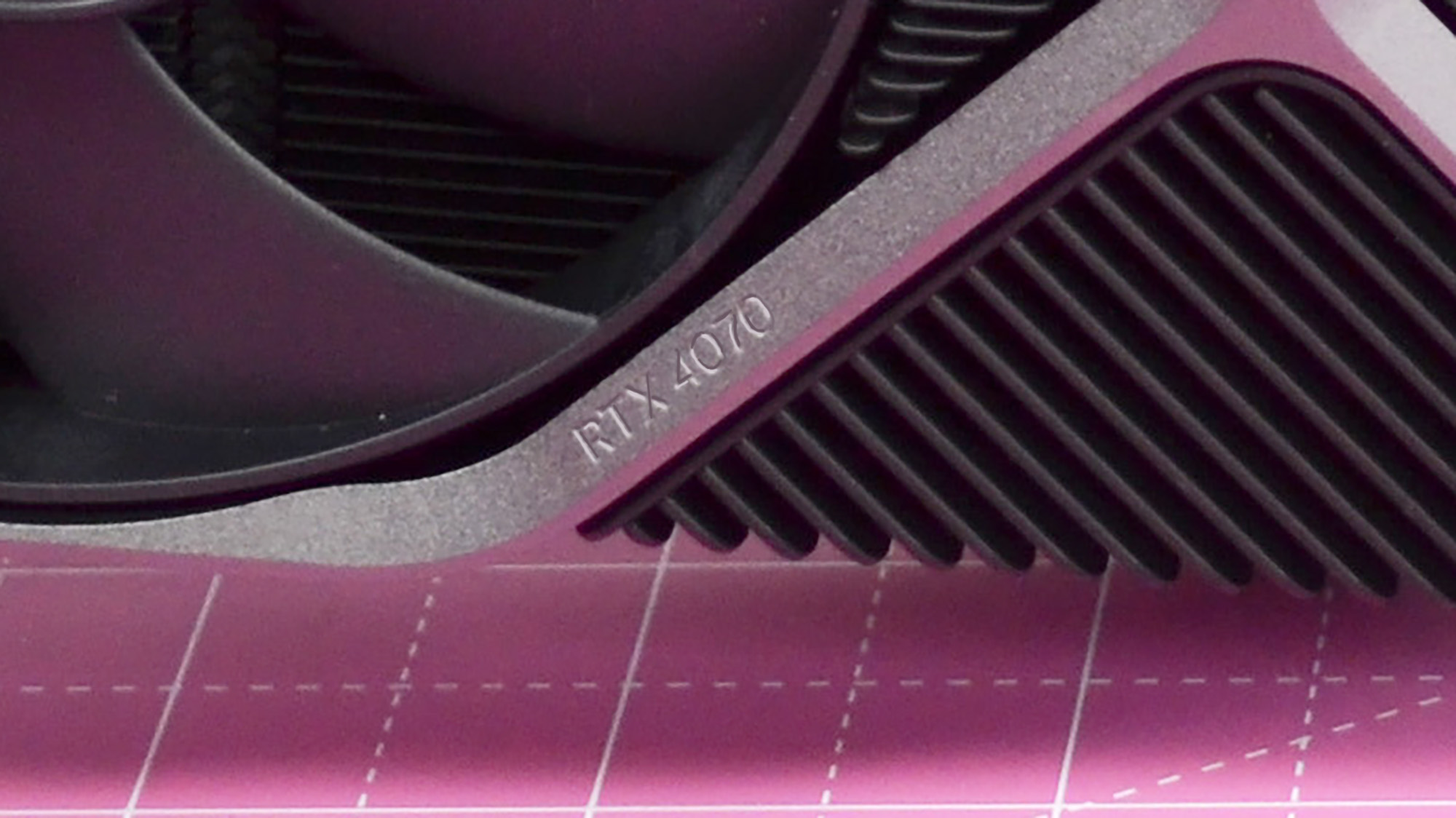
There are really only three major design points that matter when looking at the RTX 4070 vs 4070 Ti: namely that the RTX 4070 Ti does not have a Founders Edition, so what design you ultimately get for the RTX 4070 Ti will depend entirely on the manufacturer you decide to buy it from.
The second point being that the Nvidia's Founders Edition RTX 4070 packs in a remarkable amount of power inside a card no bigger than the RTX 3070 Founders Edition.
And finally that with a TGP of just 200W, the Nvidia RTX 4070 could have just ditched the 16-pin adapter entirely and gone with an 8-pin and it still would have gotten the power it needed to the card itself.
- Winner: Nvidia RTX 4070
Nvidia RTX 4070 vs RTX 4070 Ti: Performance
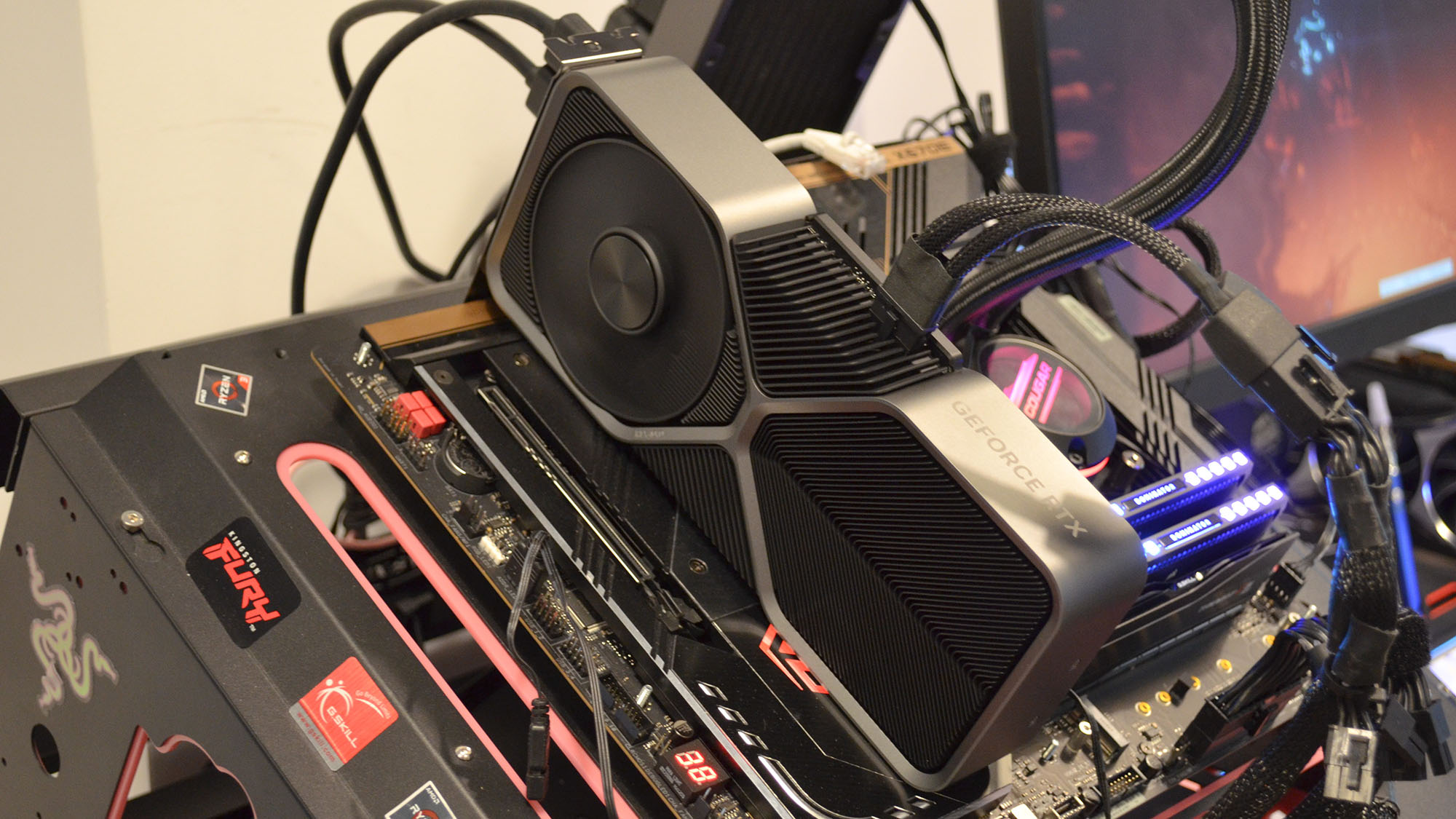
Here is the systems I used to test the Nvidia GeForce RTX 4070 and RTX 4070 Ti:
CPU: AMD Ryzen 9 7950X3D
CPU Cooler: Cougar Poseidon GT 360 AIO Cooler
DDR5 RAM: 32GB Corsair Dominator Platinum @ 5,200MHz & 32GB G.Skill Trident Z5 Neo @ 5,200MHz
Motherboard: ASRock X670E Taichi
SSD: Samsung 980 Pro SSD @ 1TB
Power Supply: Corsair AX1000 80-Plus Titanium (1000W) Case: Praxis Wetbench
Ultimately, which card you decide to buy is going to come down to which one gives you the performance you need at the lowest cost, and given that both of these cards are near-ish in price, the extra performance you can get out of the RTX 4070 Ti really weighs heavy in this round.
In synthetic performance, the RTX 4070 Ti consistently scores about 22-25% better than the RTX 4070, with some notable exceptions like Nightraid and PassMark 3D DirectX which temper the overall average a bit so that the RTX 4070 Ti ends up with about 16% better performance than the RTX 4070.
This isn't surprising given the greater number of stream multiprocessors on the RTX 4070 Ti, along with more RT and tensor cores that go with them.
| Header Cell - Column 0 | RTX 4070 | RTX 4070 Ti | Performance Difference |
|---|---|---|---|
3DMark Firestrike (1080p) | 44,288 | 54,882 | 23.92% |
3DMark Nightraid (1080p) | 179,557 | 184,183 | 2.58% |
3DMark Speedway (1440p) | 4,454 | 5,457 | 22.52% |
3DMark Port Royal (1440p) | 11,154 | 14,256 | 27.81% |
3DMark Time Spy (1440p) | 17,778 | 23,018 | 29.48% |
3DMark Firestrike Extreme (1440p) | 21,482 | 27,223 | 26.73% |
3DMark Time Spy Extreme (2160p) | 8,541 | 11,091 | 29.85% |
3DMark Firestrike Ultra (2160p) | 10,037 | 13,568 | 35.17% |
3DMark Wildlife Extreme (2160p) | 36,008 | 46,251 | 28.45% |
3DMark Wildlife Extreme Unlimited (2160p) | 35,343 | 45,991 | 30.13% |
PassMark 3D DirectX Test | 34,913 | 40,610 | 16.32% |
| Row 11 - Cell 0 | Row 11 - Cell 1 | Row 11 - Cell 2 | Row 11 - Cell 3 |
| Row 12 - Cell 0 | Row 12 - Cell 1 | Row 12 - Cell 2 | Row 12 - Cell 3 |
| Row 13 - Cell 0 | Row 13 - Cell 1 | Row 13 - Cell 2 | Row 13 - Cell 3 |
Average Synthetic Performance | 36,687 | 42,411 | 15.61% |
Likewise, with creative workloads, both cards do very well, but the RTX 4070 Ti ends up doing about 22% better in terms of rendering and video transcoding overall.
It also gets noticeably better performance in Lumion 12.5's production quality 4K @ 60 fps movie render workload, producing 373 frames an hour of 4K rendered video, which is about 42% faster than the RTX 4070.
| Header Cell - Column 0 | RTX 4070 | RTX 4070 Ti | Performance Difference |
|---|---|---|---|
V-Ray 5 CUDA | 1,871 | 2,351 | 25.65% |
V-Ray 5 RTX | 2,629 | 3,131 | 19.09% |
Lumion 12.5 1080p@60 fps, draft quality | 7,176 frames/hr | 7,796 frames/hr | 8.63% |
Lumion 12.5 1080p@60 fps, production quality | 730 frames/hr | 962 frames/hr | 31.88% |
Lumion 12.5 2160p@60 fps, production quality | 264 frames/hr | 373 frames/hr | 41.45% |
Lumion 12.5 8K image render, production quality | 42 frames/hr | 52 frames/hr | 24.64% |
Handbrake 4K to 1080p GPU encode | 170 frames/sec | 167 frames/sec | -1.76% |
| Row 7 - Cell 0 | Row 7 - Cell 1 | Row 7 - Cell 2 | Row 7 - Cell 3 |
| Row 8 - Cell 0 | Row 8 - Cell 1 | Row 8 - Cell 2 | Row 8 - Cell 3 |
| Row 9 - Cell 0 | Row 9 - Cell 1 | Row 9 - Cell 2 | Row 9 - Cell 3 |
Average Creative Performance | 1,587 | 1,939 | 22.18% |
Finally, When it comes to gaming, the RTX 4070 Ti is simply in another league, even though the RTX 4070's performance across resolutions and settings is generally very good.
| Header Cell - Column 0 | RTX 4070 | RTX 4070 Ti | Performance Difference |
|---|---|---|---|
1080p, max settings, fps | Avg | Min (1%) | Avg | Min (1%) | Avg | Min (1%) |
Metro: Exodus | 73 | 46 | 92 | 54 | 26.03% | 17.39% |
F1 2022 | 259 | 230 | 288 | 240 | 11.2% | 4.35% |
Total War: Warhammer III | 136 | 100 | 166 | 130 | 22.06% | 30.0% |
Cyberpunk 2077 | 85 | 69 | 111 | 90 | 30.59% | 29.82% |
Returnal | 131 | 76 | 167 | 79 | 27.48% | 3.95% |
Tiny Tina's Wonderland | 156 | 124 | 360 | 266 | 62.5% | 59.57% |
Counterstrike: Global Offensive | 722 | 764 | 62.75% |
| Row 8 - Cell 0 | Row 8 - Cell 1 | Row 8 - Cell 2 | Row 8 - Cell 3 |
| Row 9 - Cell 0 | Row 9 - Cell 1 | Row 9 - Cell 2 | Row 9 - Cell 3 |
| Row 10 - Cell 0 | Row 10 - Cell 1 | Row 10 - Cell 2 | Row 10 - Cell 3 |
Average Native 1080p, Non-RT Performance | 143 | 111 | 199 | 145 | 38.72% | 31.14% |
| Header Cell - Column 0 | RTX 4070 | RTX 4070 Ti | Performance Difference |
|---|---|---|---|
1440p, max settings, fps | Avg | Min (1%) | Avg | Min (1%) | Avg | Min (1%) |
Metro: Exodus | 77 | 47 | 96 | 57 | 24.68% | 21.28% |
F1 2022 | 204 | 170 | 241 | 205 | 20.59% | 28.24% |
Total War: Warhammer III | 91 | 64 | 113 | 86 | 24.18% | 34.38% |
Cyberpunk 2077 | 48 | 37 | 66 | 51 | 37.5% | 37.84% |
Returnal | 101 | 65 | 124 | 70 | 22.77% | 7.69% |
Tiny Tina's Wonderland | 107 | 91 | 258 | 194 | 59.81% | 50.55% |
Counterstrike: Global Offensive | 479 | 545 | 29.27% |
| Row 8 - Cell 0 | Row 8 - Cell 1 | Row 8 - Cell 2 | Row 8 - Cell 3 |
| Row 9 - Cell 0 | Row 9 - Cell 1 | Row 9 - Cell 2 | Row 9 - Cell 3 |
| Row 10 - Cell 0 | Row 10 - Cell 1 | Row 10 - Cell 2 | Row 10 - Cell 3 |
Average Native 1440p, Non-RT Performance | 105 | 80 | 148 | 110 | 40.35% | 37.61% |
| Header Cell - Column 0 | RTX 4070 | RTX 4070 Ti | Performance Difference |
|---|---|---|---|
2160p, max settings, fps | Avg | Min (1%) | Avg | Min (1%) | Avg | Min (1%) |
Metro: Exodus | 33 | 21 | 66 | 43 | 100% | 104.76% |
F1 2022 | 136 | 116 | 156 | 130 | 14.71% | 12.07% |
Total War: Warhammer III | 47 | 33 | 58 | 43 | 23.40% | 30.30% |
Cyberpunk 2077 | 19 | 15 | 29 | 21 | 52.63% | 40.0% |
Returnal | 59 | 39 | 74 | 45 | 25.42% | 15.38% |
Tiny Tina's Wonderland | 56 | 47 | 137 | 100 | 62.50% | 59.57% |
Counterstrike: Global Offensive | 224 | 282 | 62.75% |
| Row 8 - Cell 0 | Row 8 - Cell 1 | Row 8 - Cell 2 | Row 8 - Cell 3 |
| Row 9 - Cell 0 | Row 9 - Cell 1 | Row 9 - Cell 2 | Row 9 - Cell 3 |
| Row 10 - Cell 0 | Row 10 - Cell 1 | Row 10 - Cell 2 | Row 10 - Cell 3 |
Average Native 2160p, Non-RT Performance | 58 | 45 | 45 | 34 | 31.58% | 39.02% |
Regardless of the benchmarks run, the RTX 4070 Ti generally overperforms the RTX 4070 in native res, non-ray-traced gaming by about 35% at 1080p, about 39% at 1440p, and about 43% at 4K.
| Header Cell - Column 0 | RTX 4070 | RTX 4070 Ti | Performance Difference |
|---|---|---|---|
1080p, max settings, fps | Avg | Min (1%) | Avg | Min (1%) | Avg | Min (1%) |
Metro: Exodus | 73 | 46 | 108 | 59 | 24.14% | 15.69% |
F1 2022 | 127 | 108 | 173 | 159 | 36.22% | 47.22% |
Cyberpunk 2077 | 57 | 44 | 74 | 56 | 29.82% | 27.27% |
Returnal | 109 | 63 | 136 | 87 | 24.77% | 38.10% |
| Row 5 - Cell 0 | Row 5 - Cell 1 | Row 5 - Cell 2 | Row 5 - Cell 3 |
| Row 6 - Cell 0 | Row 6 - Cell 1 | Row 6 - Cell 2 | Row 6 - Cell 3 |
| Row 7 - Cell 0 | Row 7 - Cell 1 | Row 7 - Cell 2 | Row 7 - Cell 3 |
Average Native 1080p, RT Performance | 93 | 65 | 127 | 96 | 37.51% | 46.51% |
| Header Cell - Column 0 | RTX 4070 | RTX 4070 Ti | Performance Difference |
|---|---|---|---|
1440p, max settings, fps | Avg | Min (1%) | Avg | Min (1%) | Avg | Min (1%) |
Metro: Exodus | 59 | 38 | 76 | 48 | 28.81% | 26.32% |
F1 2022 | 85 | 73 | 109 | 93 | 28.24% | 27.40% |
Cyberpunk 2077 | 35 | 27 | 47 | 35 | 34.29% | 29.63% |
Returnal | 76 | 54 | 99 | 47 | 30.26% | -12.96% |
| Row 5 - Cell 0 | Row 5 - Cell 1 | Row 5 - Cell 2 | Row 5 - Cell 3 |
| Row 6 - Cell 0 | Row 6 - Cell 1 | Row 6 - Cell 2 | Row 6 - Cell 3 |
| Row 7 - Cell 0 | Row 7 - Cell 1 | Row 7 - Cell 2 | Row 7 - Cell 3 |
Average Native 1440p, RT Performance | 64 | 48 | 87 | 61 | 35.84% | 26.67% |
| Header Cell - Column 0 | RTX 4070 | RTX 4070 Ti | Performance Difference |
|---|---|---|---|
2160p, max settings, fps | Avg | Min (1%) | Avg | Min (1%) | Avg | Min (1%) |
Metro: Exodus | 17 | 13 | 46 | 32 | 164.71% | 146.15% |
F1 2022 | 48 | 40 | 56 | 48 | 16.67% | 20.0% |
Cyberpunk 2077 | 15 | 8 | 19 | 14 | 26.67% | 75.0% |
Returnal | 52 | 30 | 55 | 36 | 5.77% | 20.0% |
| Row 5 - Cell 0 | Row 5 - Cell 1 | Row 5 - Cell 2 | Row 5 - Cell 3 |
| Row 6 - Cell 0 | Row 6 - Cell 1 | Row 6 - Cell 2 | Row 6 - Cell 3 |
| Row 7 - Cell 0 | Row 7 - Cell 1 | Row 7 - Cell 2 | Row 7 - Cell 3 |
Average Native 2160p RT Performance | 34 | 25 | 45 | 34 | 31.58% | 39.02% |
Switch on ray tracing, and the performance on both cards takes a substantial hit unless you use DLSS. Without the upscaling tech though, the RTX 4070 averages about 34 fps with a 25 fps floor at 4K and a 64 fps average with a 48 fps floor at 1440p. Compared to the RTX 4070 Ti's 45 fps average (34 fps floor) at 4K and an 87 fps average with 61 fps floor at 1440p, and you have a card that outperforms the RTX 4070 by about 36% overall at 1440p and 4K gameplay.
| Header Cell - Column 0 | RTX 4070 | RTX 4070 Ti | Performance Difference |
|---|---|---|---|
| Row 0 - Cell 0 | Avg | Min (1%) | Avg | Min (1%) | Avg | Min (1%) |
1080p | 167 | 98 | 192 | 130 | 14.96% | 32.35% |
1440p | 125 | 87 | 158 | 102 | 26.4% | 17.05% |
2160p | 108 | 76 | 79 | 60 | 36.67% | 27.83% |
| Row 4 - Cell 0 | Row 4 - Cell 1 | Row 4 - Cell 2 | Row 4 - Cell 3 |
| Row 5 - Cell 0 | Row 5 - Cell 1 | Row 5 - Cell 2 | Row 5 - Cell 3 |
| Row 6 - Cell 0 | Row 6 - Cell 1 | Row 6 - Cell 2 | Row 6 - Cell 3 |
Average RT Performance w/ DLSS 2.0 | 124 | 82 | 152 | 103 | 22.58% | 25.61% |
So much of that performance loss for the RTX 4070 can be negated with DLSS, especially when set to ultra performance. It will still lag behind the RTX 4070 Ti by about 23-25% overall, but with just DLSS 2.0, the RTX 4070 is able to get just shy of 80 fps average at 4K with ray tracing maxed out. And crucially, it has an average floor of 60 fps at 4K with RT and DLSS turned on, which would easily give it a very smooth gaming experience overall.
Still, as impressive as the RTX 4070 is for the package it comes with, the RTX 4070 Ti is simply the better performer by a substantial margin when it comes to gaming.
| Header Cell - Column 0 | RTX 4070 | RTX 4070 Ti | Performance Difference |
|---|---|---|---|
| Row 0 - Cell 0 | Avg | Min (1%) | Avg | Min (1%) | Avg | Min (1%) |
1080p | 134 | 91 | 173 | 123 | 28.59% | 35.24% |
1440p | 98 | 72 | 131 | 91 | 33.44% | 26.85% |
2160p | 57 | 43 | 79 | 58 | 38.57% | 34.12% |
| Row 4 - Cell 0 | Row 4 - Cell 1 | Row 4 - Cell 2 | Row 4 - Cell 3 |
| Row 5 - Cell 0 | Row 5 - Cell 1 | Row 5 - Cell 2 | Row 5 - Cell 3 |
| Row 6 - Cell 0 | Row 6 - Cell 1 | Row 6 - Cell 2 | Row 6 - Cell 3 |
Average Overal Gaming Performance | 96 | 69 | 127 | 91 | 32.19% | 32.08% |
Finally, bringing all the scores together into our final score and you get a roughly 16% better performance across all workloads for the RTX 4070 Ti.
| Header Cell - Column 0 | RTX 4070 | RTX 4070 Ti | Performance Difference |
|---|---|---|---|
Synthetics | 36,687 | 42,411 | 15.61% |
Creative | 1,587 | 1,939 | 13.96% |
Gaming | 96 | 127 | 32.19% |
| Row 3 - Cell 0 | Row 3 - Cell 1 | Row 3 - Cell 2 | Row 3 - Cell 3 |
| Row 4 - Cell 0 | Row 4 - Cell 1 | Row 4 - Cell 2 | Row 4 - Cell 3 |
| Row 5 - Cell 0 | Row 5 - Cell 1 | Row 5 - Cell 2 | Row 5 - Cell 3 |
Final Average Performance | 12,790 | 14,825 | 15.91% |
There is just one last thing to note about the performance of these two cards, and that is the all-important value metric, i.e., how much performance are you getting for every dollar or pound spend.
| Header Cell - Column 0 | RTX 4070 | RTX 4070 Ti | Performance Difference |
|---|---|---|---|
Final Score | 12,790 | 14825 | 15.91% |
MSRP | $599 | $799 | 33.38% |
| Row 2 - Cell 0 | Row 2 - Cell 1 | Row 2 - Cell 2 | Row 2 - Cell 3 |
| Row 3 - Cell 0 | Row 3 - Cell 1 | Row 3 - Cell 2 | Row 3 - Cell 3 |
| Row 4 - Cell 0 | Row 4 - Cell 1 | Row 4 - Cell 2 | Row 4 - Cell 3 |
Performance per MSRP $ | 21.35 | 18.55 | -15.1% |
By this measure, the RTX 4070 Ti isn't as good of a value as the RTX 4070, seeing as the RTX 4070 Ti is about 34% more expensive but offers only 16% better performance overall.
Still, if we are talking in absolute terms, which we kind of have to, then there's no denying that the RTX 4070 Ti will get you much better performance no matter what kind of workload you plan on throwing at it.
- Winner: Nvidia RTX 4070 Ti
Which one should you buy?
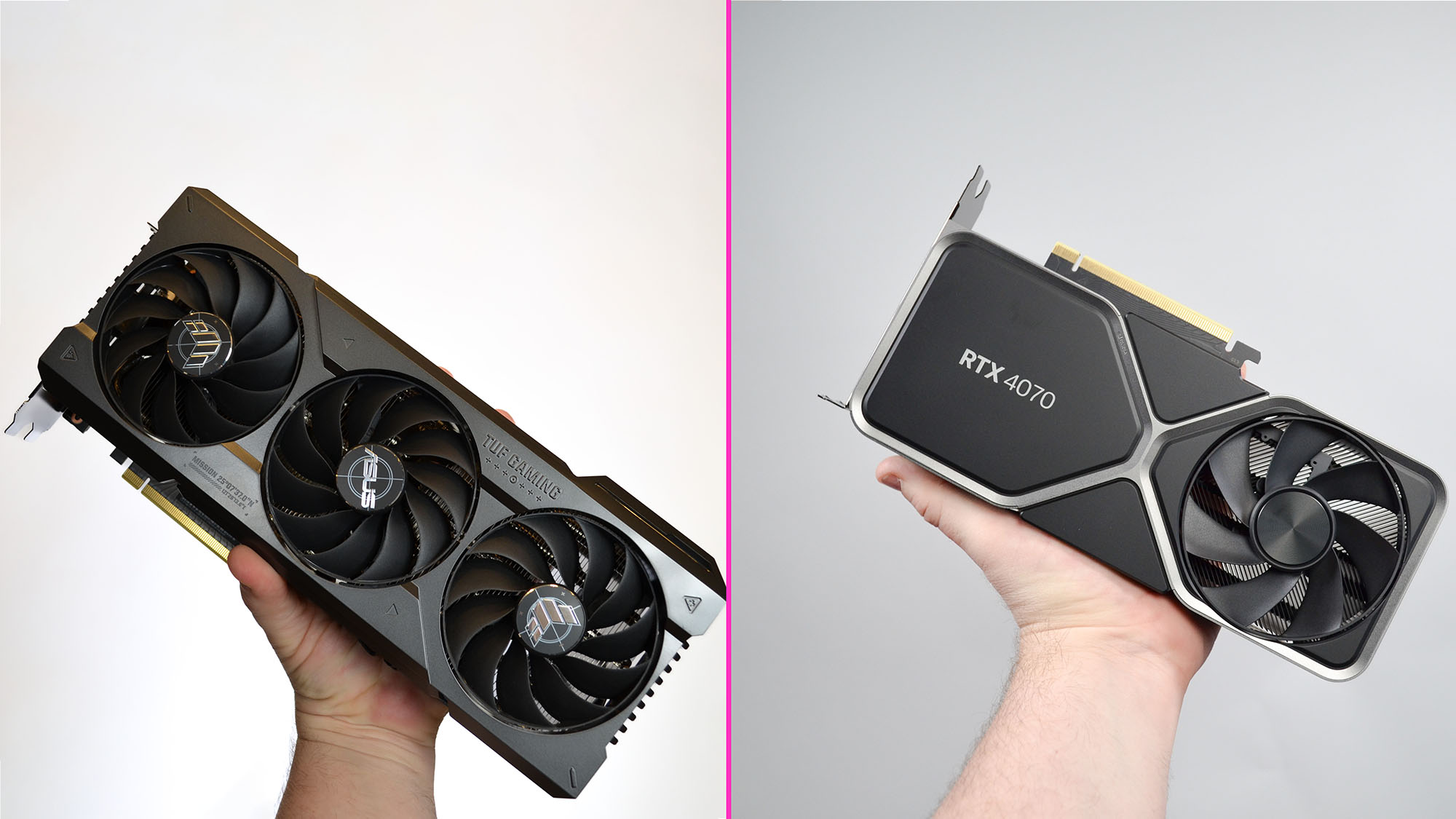
This is genuinely one of the hardest questions to answer, since the RTX 4070 vs 4070 Ti are very close in terms of price and the performance differential isn't as wide as it is when looking at the RTX 4070 vs 4080, which has a much cleaner division between great performance all the way on one side and a significantly more affordable card on the other.
As it stands, you'll really have to make that decision on your own given what you know about your needs. Generally, if money isn't a concern, go for the RTX 4070 Ti. But if you have to pay bills like the rest of us, you can't just ignore the more affordable price of the RTX 4070. With that card, you're definitely going to get a much better value while still enjoying fantastic performance in all you endeavours.
I'd say that for most people out there, the RTX 4070 is definitely the card to go for. It's performance is excellent and its under $600 MSRP, which for most people is going to be their primary motivating factor in making a purchase like this.

Formerly TechRadar Gaming's Hardware Editor, Aleksha McLoughlin is now a freelance writer and editor specializing in computing tech, video games, and E-commerce. As well as her many contributions to this site, you'll also find her work available on sister sites such as PC Gamer, GamesRadar, and Android Central. Additionally, more of her bylines can be found on Trusted Reviews, Dexerto, Expert Reviews, Techopedia, PC Guide, VideoGamer, and more.
- John LoefflerComponents Editor
You must confirm your public display name before commenting
Please logout and then login again, you will then be prompted to enter your display name.